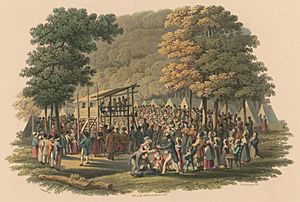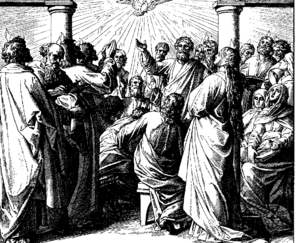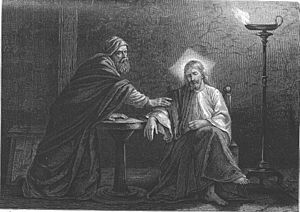Born again facts for kids
Born again, or experiencing a new birth, is a phrase used by many Christians. It means a "spiritual rebirth" or a fresh start for a person's spirit. Unlike being born physically, being "born again" is believed to happen because of the Holy Spirit. It is not caused by water baptism alone.
This idea is very important to many Christian groups. These include the Anabaptist, Moravian, Methodist, Baptist, Plymouth Brethren and Pentecostal Churches. All these groups, and other evangelical Christian churches, strongly believe in Jesus's words from the Gospels. In the Bible, John 3:6-7 says: "You must be born again before you can see, or enter, the Kingdom of Heaven". Their teachings also say that to be "born again" and "saved", a person needs a close, personal connection with Jesus Christ.
The phrase "born again" comes from the New Testament part of the Bible. In his first letter, Apostle Peter says this new birth comes from the "Word of God". (1 Peter 1:23). In the gospel of Luke, Jesus himself calls the Word of God a "seed". (Luke 8:11).
Today, outside of evangelical churches, the term "born again" is different from other Christian terms. These other terms might refer to someone becoming a Christian through baptism with water. People who say they are "born again" often mean they have a "personal relationship with Jesus Christ".
Some evangelical Christians use this phrase to talk to people who are not Christians. They also use it to talk to people from other Christian groups. This is because they believe that even other Christians might not be "born again". They think these people might not have a "personal relationship with Jesus". So, they share their faith with them, just like they would with someone who is not Christian.
The phrase "born again" is also used to describe people who believe this way. For example, you might hear "born-again Christian". It can also describe the whole movement, like the "born-again movement".
Contents
How the Idea Started
The idea of being "born again" comes from a story in the Gospel of John. In this story, Jesus was talking to a Jewish leader named Nicodemus. Nicodemus did not understand Jesus's words at first.
Jesus said, "No one can see God's kingdom unless they are born again." Nicodemus asked, "How can someone be born when they are old? They cannot go back into their mother's womb to be born a second time!" Jesus answered, "No one can enter God's kingdom unless they are born of water and the Spirit."
The Gospel of John was written in Koine Greek, an old form of Greek. The original word for "again" (ἄνωθεν, ánōtʰen) can mean two things. It can mean "again" or "from above". This created a bit of confusion for Nicodemus. He thought Jesus meant being born physically a second time. But Jesus was explaining a spiritual rebirth that comes "from above" or from God.
Most English Bibles choose one meaning, like "born again". But many Bibles will add a note to explain the other meaning, "born from above". Some scholars believe "born from above" is the main meaning. This means the new life comes from God himself.
The phrase is also used in the First Epistle of Peter. It says people are "born again" not from something that can spoil, but from something that lasts forever. This comes "by the word of God".
What Different Christian Groups Believe
Catholicism
The Catholic Church has historically understood "born again" to refer to baptism. They believe that when someone is baptized, they are "born of water and Spirit". This is seen as the start of a new life in Christ.
The Catechism of the Catholic Church explains that baptism washes away past sins. It makes the baptized person a new creation and a child of God. It also connects them to the Body of Christ. Baptism is a special event that cannot be repeated. The Holy Spirit is involved in this change.
The Catholic Church also teaches that in special cases, like when someone dies before baptism, the Holy Spirit can still bring about this new life. This is called 'Baptism of desire'.
Pope John Paul II talked about children who are baptized but do not have a strong personal connection to Jesus. He said that being a Christian means saying "yes" to Jesus. It means trusting God's word and trying to understand it more deeply.
Today, the idea of being "born again" in Catholicism is often linked to "conversion". This means accepting a personal relationship with Christ. It means truly following him and trying to live like him.
Lutheranism
The Lutheran Church believes that people are cleaned of their sins and "born again" in Holy Baptism by the Holy Spirit. Some Lutherans also teach that after baptism, a person should work daily to live a pure life. They believe that if someone continues to live in sin after baptism, they might lose the grace given in baptism.
Moravianism
The Moravian Church sees personal conversion to Christianity as a joyful event. In this event, a person "accepts Christ as Lord". After this, their faith "grows daily inside the person". Moravians believe that Christ lived as a human to show us how to live. A converted person tries to live like Jesus and become more like him every day. Moravians have always focused on sharing their faith with others.
Anabaptism
Anabaptist groups, like the Mennonites, teach that true faith means a "new birth". This is a spiritual renewal by God's grace. Believers are seen as God's spiritual children. In Anabaptist teaching, the way to salvation involves repentance, self-denial, faith, rebirth, and obedience. People who choose this path are baptized after they experience this new birth.
Anglicanism
The phrase "born again" is found in the 39 Articles of the Anglican Church. Article XV says, "all we the rest, although baptized and born again in Christ, yet offend in many things". This shows that Anglicans connect being "born again" with baptism.
Reformed
In Reformed theology, Holy Baptism is a sign of a person's spiritual renewal. This brings comfort to the believer. However, the exact time of this renewal is a mystery.
Reformed churches believe being born again means the Holy Spirit works inside a person. This helps the person respond to God's call. They believe that God's Spirit helps people understand their sins. It also helps them know Christ and want to follow him.
In Reformed teaching, spiritual renewal happens before faith. This means God first changes a person's heart. Only then can they truly believe. They believe that God alone causes this change. People cannot do anything on their own to make it happen.
Quakerism
Most Quakers around the world are evangelical. They teach about a "born-again" experience.
The Central Yearly Meeting of Friends, a Quaker group, teaches that spiritual renewal is God's work of salvation. This includes being forgiven for sins and becoming God's child. In this new birth, a believer's heart is changed. They become a "new creation in Christ".
After this new birth, George Fox, a founder of Quakerism, taught that people could become completely holy. This happens through a special experience with the Holy Spirit.
Methodism

In Methodism, the "new birth" is needed for salvation because it leads to holiness. This comes with faith. John Wesley, a founder of Methodism, said the New Birth is a big change God makes in a person's soul. It brings them from a life of sin to a life of goodness. For Christians, the new birth is seen as the first work of grace.
The Articles of Religion state that baptism is a "sign of regeneration or the new birth". Methodist teaching says the new birth has two parts that happen at the same time: justification and regeneration. Justification means God forgives all sins. Regeneration means God gives new life, changing a person's character from loving sin to loving God.
Baptists
Baptists teach that people are born again when they believe that Jesus died for their sins. They believe Jesus was buried and rose again. By trusting in Jesus's death, burial, and resurrection, people receive eternal life as a gift from God. Baptists believe that those who are born again know they are God's children. This is because the Holy Spirit tells them so.
Plymouth Brethren
The Plymouth Brethren teach that the new birth brings salvation. Those who say they have been born again, have repented, and believe the Bible are welcomed into their community. After this, they can take part in the Lord's Supper.
Pentecostalism

Holiness Pentecostals teach that the new birth gives "spiritual life". They also teach about entire sanctification (a second work of grace) and baptism with the Holy Spirit. This baptism is often shown by speaking in tongues.
Jehovah's Witnesses
Jehovah's Witnesses believe that people cannot choose to be born again themselves. They believe God chooses and selects his followers "from above". Only those belonging to a special group called the "144,000" are considered to be born again.
The Church of Jesus Christ of Latter-day Saints
The Book of Mormon teaches that everyone needs to be reborn of God.
Latter Day Saints believe that being born again means truly repenting. This means turning away from sinful ways and making a promise to God to live a righteous life like Christ. This promise is first made through baptism by immersion. This happens at age 8 or when someone new joins the church. This promise is then renewed each week by taking part in the sacrament during church meetings.
It is sometimes misunderstood that this church teaches these actions are required to be "saved". Instead, they teach that Christ has already saved all people from physical death. He will save them from spiritual death through repentance and obeying God's commandments. This happens on judgment day, after death and resurrection. Baptism and sacrament are done as an outward sign of a person's faith and their promise to serve God.
History and How the Term is Used
Historically, Christianity has used different ways to describe becoming a Christian. This often involved baptism and spiritual renewal through water and the Holy Spirit. This is still how most Christian groups understand it. This includes Roman Catholicism, Eastern Orthodoxy, Lutheranism, and Anglicanism.
However, after the Protestant Reformation, Evangelicalism began to focus more on "born again" as a personal religious conversion experience. This means accepting Jesus Christ as Lord and Savior to be saved. This belief is also a key part of Methodist teaching.
Encyclopædia Britannica says that "rebirth" is often seen as a clear moment of "conversion". This can mean a new way of thinking or feeling. It can also mean finding new abilities or a deeper understanding of life.
According to J. Gordon Melton, "born again" is a phrase many Protestants use. It describes gaining faith in Jesus Christ. It is an experience where everything they learned about Christianity becomes real. They develop a direct and personal connection with God.
The term "born again" became very popular with the evangelical Christian movement starting in the late 1960s. This happened first in the United States and then worldwide. It was linked to the Jesus movement and Christian counterculture. "Born again" came to mean a conversion experience. This meant accepting Jesus Christ as Lord and Savior to be saved from hell and have eternal life with God. It became a way to identify strong believers. By the mid-1970s, "born again" Christians were often talked about in the news.
In 1976, Watergate figure Chuck Colson wrote a book called Born Again. This book became famous around the world. Colson described his journey to faith while he was in prison. He helped make "born again" a well-known idea in the US. He wrote that his spiritual experience came after a lot of struggle. He prayed, "Lord Jesus, I believe in You. I accept You. Please come into my life. I commit it to You." He felt a new strength, peace, and understanding about life.
Jimmy Carter was the first President of the United States to publicly say he was born-again in 1976. By the 1980 election, all three main candidates said they had been born again.
Studies show that "born-again" identification is often linked to certain political and economic views. For example, Black Americans are more likely to identify as born-again (63%) than white Americans (39%). Republicans are also more likely (52%) than Democrats (36%).
Names Inspired by the Term
The idea of "rebirth in Christ" has inspired some common European names. For example, French René/Renée, Italian Renato/Renata, and Latin Renatus/Renata. All these names mean "reborn" or "born again".
Statistics
The GSS has asked people if they have been "born again" or had a "born-again" experience. About two-thirds of evangelical, Black, and Latino Protestants say yes. In contrast, about one-third of mainline Protestants and one-sixth of Catholics say yes.
See also
 In Spanish: Nuevo nacimiento para niños
In Spanish: Nuevo nacimiento para niños
- Altar call
- Baptismal regeneration
- Born-again virgin
- Child dedication
- Christian nationalism
- Dvija
- Evangelism
- Jesus movement
- Monergism
- Sinner's prayer
 | Aaron Henry |
 | T. R. M. Howard |
 | Jesse Jackson |


